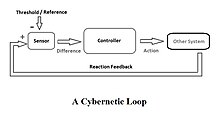The systems science portal
 |
| Complex systems approach |
Systems science is an transdisciplinary[1] field that studies the nature of systems—from simple to complex—in nature, society, cognition, engineering, technology and science itself. To systems scientists, the world can be understood as a system of systems. The field aims to develop interdisciplinary foundations that are applicable in a variety of areas, such as psychology, biology, medicine, communication, business management, engineering, and social sciences.
Systems science covers formal sciences such as complex systems, cybernetics, dynamical systems theory, information theory, linguistics or systems theory. It has applications in the field of the natural and social sciences and engineering, such as control theory, operations research, social systems theory, systems biology, system dynamics, human factors, systems ecology, systems engineering and systems psychology. Themes commonly stressed in system science are (a) holistic view, (b) interaction between a system and its embedding environment, and (c) complex (often subtle) trajectories of dynamic behavior that sometimes are stable (and thus reinforcing), while at various 'boundary conditions' can become wildly unstable (and thus destructive). Concerns about Earth-scale biosphere/geosphere dynamics is an example of the nature of problems to which systems science seeks to contribute meaningful insights.
Selected article -

Cybernetics is a field of systems theory that studies circular causal systems whose outputs are also inputs, such as feedback systems. It is concerned with the general principles of circular causal processes, including in ecological, technological, biological, cognitive and social systems and also in the context of practical activities such as designing, learning, and managing.
The field is named after an example of circular causal feedback—that of steering a ship (the ancient Greek κυβερνήτης (kybernḗtēs) means "helmsperson"). In steering a ship, the helmsperson adjusts their steering in continual response to the effect it is observed as having, forming a feedback loop through which a steady course can be maintained in a changing environment, responding to disturbances from cross winds and tide. (Full article...)Selected picture

This image illustrates part of the Mandelbrot set fractal. The size of the JPEG file encoding the bitmap of this image is more than 17 kilobytes (approximately 140000 bits). The same file can be generated by a computer program much shorter than 140000 bits, however. Thus, the Kolmogorov complexity of the JPEG file encoding the bitmap is much less than 140000.
'WikiProjects
Selected biography -
Margaret Mead (December 16, 1901 – November 15, 1978) was an American cultural anthropologist who featured frequently as an author and speaker in the mass media during the 1960s and the 1970s.
She earned her bachelor's degree at Barnard College of Columbia University and her M.A. and Ph.D. degrees from Columbia. Mead served as president of the American Association for the Advancement of Science in 1975. (Full article...)Did you know
- ... that self-organization is a process of attraction and repulsion in which the internal organization of a system, normally an open system, increases in complexity without being guided or managed by an outside source?
- ... that the American biologist Christopher Langton in the late 1980s is one of the founders of the field of artificial life.
- ... that the American ecologist Howard T. Odum in 1950 gave a novel definition of ecology as the study of large entities (ecosystems) at the "natural level of integration".
- ... that the American neurophysiologist Ralph W. Gerard late 1940s developed an intracellular recording microelectrode, that revolutionized research in neurobiology?
Categories
Related portals
Topics
Tasks
 |
Here are some tasks awaiting attention:
|
Associated Wikimedia
-

-

-

-

-
Random portal










